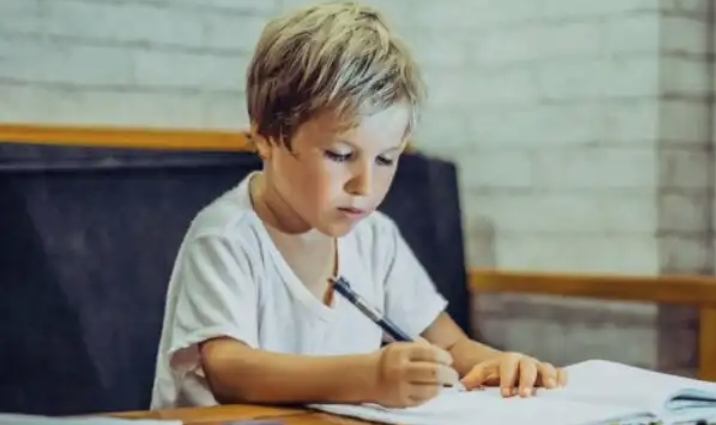Within a child who is hyperactive or has attention problems, often hides someone with high intellectual capacity. However, we tend to pay more attention to their problematic behavior than to their real needs.
ADHD and giftedness can go hand in hand, avoiding identification. In fact, this is so common that people often reach adulthood undiagnosed. Worse still, they fail to develop and fulfill their potential. This is a reality that is repeated every day and invites us to think more.
Why is this happening? Why are there not earlier diagnoses of intellectual giftedness or high capacities? The first is that we tend to harbor false myths. We don’t accept that not every bright student wants to get outstanding grades or be exceptionally well-behaved in class. In fact, the brightest kids are sometimes more restless than usual and have a history of failing in school.
Dr. Thomas E. Brown is a clinical psychologist at Yale University (USA). He is one of the leading experts on ADHD. In this case, he claims that there are many people who have a high IQ but have significant problems in effectively demonstrating their intelligence due to ADHD.
As a rule, we focus only on the behavior of these children without addressing their real needs. Let’s go a little deeper into this particular issue.
How are ADHD and giftedness related?
Recently, the term exceptional has been used twice to describe a gifted child who exhibits attention deficit hyperactivity disorder (ADHD). The combination of these two conditions is problematic because hyperactivity or attention problems affect the optimal development of their potential.
ADHD presents with a large cluster of symptoms. These include impulsivity and an inability to regulate behavior or control emotions. Dr. Thomas E. Brown states that intelligent children often show a delay in the development of their executive functioning.
This means that they lack the cognitive abilities that regulate various functions of the mind, such as attention, reflection, analysis, etc. Therefore, the biggest challenge for ADHD and gifted children or adolescents is not not understanding what they are being taught. It is in their ability to demonstrate that they understand it.

What are gifted children with ADHD like?
The Department of Psychology at Nottingham Trent University (UK) has conducted research that claims it is not easy to identify the child with ADHD and high ability. Furthermore, these students are often associated with school failures and developmental delays. This suggests that we are facing a reality to which we need to be more sensitive.
Let’s take a look at how this trait manifests itself.
- These children show a great mismatch between their potential and their executive abilities. Some may be extremely adept at verbal comprehension and others at visual-spatial reasoning. However, it can be difficult for them to sustain their attention or to be able to express their knowledge in a regular test.
- They have great competence in abstract reasoning (solving logical problems).
- They have multiple and varied interests.
- They are verbally fluent at an advanced level for their age.
- They are highly creative.
- They tend to abandon many things they have started. They are not consistent.
- They do not work well in class. They actually get bored, do not pay attention and do not respond to structured tasks.
- They act before they think. They are impulsive.
- They are not good at team tasks.
- They show great emotionality. In other words, they live intensely and exaggerate their emotions.
- They are highly empathic.
- They reject authority figures.
- They often have problems with other classmates and have integration problems.
How to meet the needs of twice-exceptional children?
Giftedness co-existing with ADHD can be quite challenging in both children and adults. In fact, these twice-exceptional individuals experience learning and life itself differently. For example, the child or adolescent who is unable to adapt to ordinary learning and fails, feels increasingly unmotivated and has a difficult relationship with their environment.
On the other hand, the characteristic that most often defines the gifted and ADHD adult is poor emotional management. They feel overwhelmed by their emotions and can be surprised and frustrated in various areas of their life, both socially and at work. This has a significant impact on them.
What to do in these situations? The most important thing is to act early. Let’s take a look.
Strategies in the school environment
- Early identification strategies for children with special education needs.
- Stimulating and personalized school environment for gifted and ADHD students.
Smaller groups in classrooms.
- Curricular arrangements adapted to their higher capacities.
- Teachers are trained to care for students with these characteristics so that the child learns to have confidence in their own abilities.
- Utilization of various educational tools such as new technologies.
- Training in study skills, time management, problem solving and resistance to frustration.
- Emotional management techniques.
- Psychological help for the student to understand their own personal reality.
Family strategies
- Having the support, sensitivity and understanding of the family is essential for the proper development of the ADHD and gifted child. In these situations, it is very important that they understand the following:
- Having high expectations of the child and the child’s perception of this reality.
- The child’s r Encourage well-structured life habits that help him/her integrate his/her routines and habits.
- Validate the child’s interests, encourage their motivation and help them manage their emotions.
- Keep in constant contact with the school.
- In conclusion, people with this psychological reality can reach great potential as long as their needs are understood. We need to be able to go beyond their appearance and their nervous and careless behavior. Behind them are minds and hearts with great needs and high capacities.





